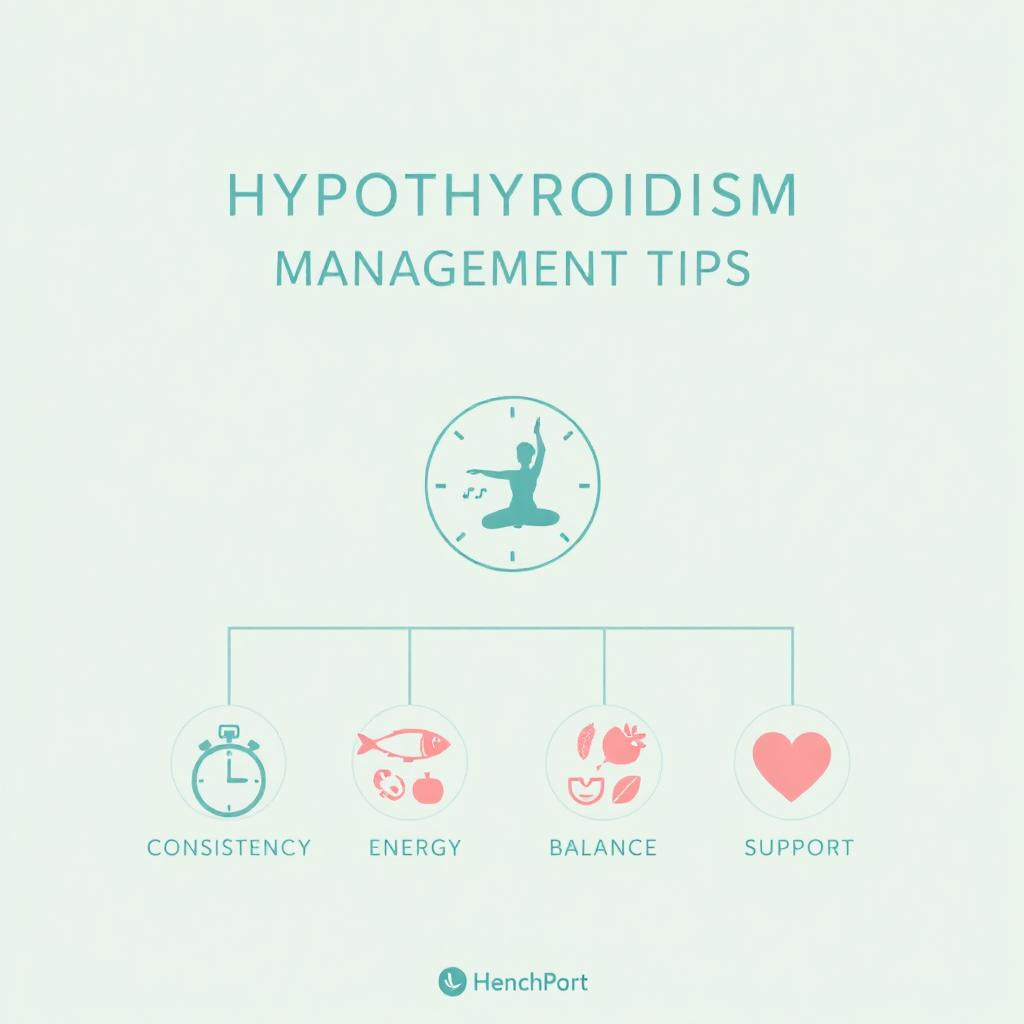Managing hypothyroidism doesn’t mean life can’t be as vibrant as ever. With the right steps and a bit of thyroid know-how, you can keep your energy up, your mood balanced, and your symptoms under control. Here’s a guide full of practical tips, humor, and a little Irish wit!

1. Take Your Thyroid Medication Like Clockwork
Think of your thyroid medication as the first guest to arrive at your breakfast party—it deserves to be taken solo and on an empty stomach. Why? When taken with food (especially that dreamy morning coffee), the medication doesn’t absorb well, which could mean less energy and slower symptom relief. Set a reminder and try to wait about 30-60 minutes before diving into breakfast. Also, take it at the same time each day so your body knows when to expect that thyroid boost!
2. Fuel Up with Nutrient-Packed Foods
Your thyroid doesn’t ask for much, but it has a taste for some specific nutrients. Iodine, selenium, zinc, and vitamin D are nutrients essential for thyroid function. Where to find them?
- Iodine: Think of it as the thyroid’s fuel. You’ll find it in seafood, eggs, and even in dairy. (A seaweed salad from time to time also does the trick, but don’t overdo it!)
- Selenium: This little mineral helps convert thyroid hormones into their active form. Just two Brazil nuts a day give you all the selenium you need.
- Zinc: Great for immune support and thyroid health. You’ll find zinc in foods like pumpkin seeds, beef, and chickpeas.
- Vitamin D: Since Ireland doesn’t always bless us with the sun, consider foods like salmon, egg yolks, and fortified milk—or chat with your GP about supplements.
3. Exercise for Energy and Mood—Yes, Really!
We know, hypothyroidism can make you feel sluggish. But regular, gentle exercise can boost your energy over time. Start with something manageable—maybe a 10-minute walk, some stretching, or even dancing around the kitchen (no judgment here!). Yoga and swimming are also fantastic because they’re gentle on joints. The goal isn’t a marathon; it’s finding activities that keep you feeling light, energized, and in control of your health.
4. Choose Heart-Healthy Foods
Hypothyroidism can sometimes nudge your cholesterol levels up, so it’s wise to eat with your heart in mind. Focus on anti-inflammatory foods: colourful vegetables, berries, whole grains, and healthy fats from olive oil, nuts, and fish. Avoid too many processed foods. A Mediterranean-style diet, with fish, whole grains, and olive oil, can do wonders for both thyroid health and overall wellness.
5. Don’t Overdo It on Goitrogens
What are goitrogens, you ask? They’re natural compounds found in foods like broccoli, cabbage, and soy, which can interfere with thyroid hormone production. This doesn’t mean you need to avoid them completely—just don’t eat them raw by the truckload. Cooking reduces their goitrogenic properties, so steaming or sautéing that cabbage or soy makes it perfectly fine to enjoy!
6. Try Yoga for Relaxation and (Potentially) Better Thyroid Function
Stress and thyroid health don’t mix well, and who couldn’t use a little less stress? Yoga offers gentle movement and relaxation, which may help manage stress and support thyroid function. Some specific poses, like the shoulder stand or fish pose, focus on the neck area where the thyroid sits, potentially helping with circulation. Just take it slow, and avoid straining your neck. Pop into a class or try a beginner’s video to see if it suits you.
7. Watch Out for Medication Interactions
Did you know certain supplements and meds can mess with your thyroid pill? Calcium, iron, and antacids can block thyroid hormone absorption if taken too close to your medication. Aim to keep these at least four hours apart from your thyroid pill to avoid any issues. A quick rule: If it’s chalky, white, or a mineral, it likely needs its own time slot.
8. Iodine—Just Enough and Not Too Much
Iodine is critical for thyroid function, but more isn’t always better. Ireland’s diet typically provides enough iodine (thanks to dairy and seafood). Unless recommended by your doctor, skip the iodine supplements, as excessive iodine can worsen thyroid problems. Stick to a balanced diet and consult with your healthcare provider if you have any concerns.
9. Regular Blood Tests to Check Thyroid Levels
Your TSH (thyroid-stimulating hormone) level acts like a progress report on your thyroid function. Routine blood tests every 6-12 months help your doctor keep tabs on your hormone levels and adjust your medication if necessary. If you’ve just started treatment, or if your dose was recently changed, tests will likely be more frequent at first. Checking in regularly ensures you’re on the right track!
10. Don’t Ignore New or Changing Symptoms
With hypothyroidism, symptoms can fluctuate. If you notice changes like sudden fatigue, weight changes, dry skin, or mood shifts, it’s a good idea to check in with your doctor. It may simply be time for a dose adjustment, or there could be other factors at play. Being proactive about your health means fewer surprises—and often a faster return to feeling good.
In Conclusion
Living with hypothyroidism can feel like a lot to manage, but each of these tips is designed to help you feel in control. With consistency, some thoughtful food choices, and a little extra self-care, hypothyroidism doesn’t have to get in the way of a vibrant life. Plus, your healthcare team is there to support you every step of the way—don’t hesitate to reach out when you need it!